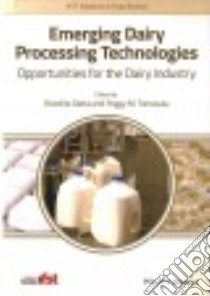Emerging Dairy Processing Technologies - 9781118560624
Un libro in lingua di Datta Nivedita (EDT) Tomasula Peggy M. (EDT) edito da Blackwell Pub, 2015
- € 235.30
- Il prezzo è variabile in funzione del cambio della valuta d’origine
Fluid milk processing is energy intensive, with high financial and energy costs found all along the production line and supply chain. Worldwide, the dairy industry has set a goal of reducing greenhouse gas (GHG) emissions and other environmental impacts associated with milk processing. Although the major GHG emissions associated with milk production occur on the farm, most energy usage associated with milk processing occurs at the milk processing plant and afterwards, during refrigerated storage (a key requirement for the transport, retail and consumption of most milk products). Sustainable alternatives and designs for the dairy processing plants of the future are now being actively sought by the global dairy industry, as it seeks to improve efficiency, reduce costs and comply with its corporate social responsibilities.
Emerging Dairy Processing Technologies: Opportunities for the Dairy Industry presents the state of the art research and technologies that have been proposed as sustainable replacements for high temperature, short time (HTST) and ultra high temperature (UHT) pasteurization, with potentially lower energy usage and GHG emissions. These technologies include pulsed electric fields, high hydrostatic pressure, high-pressure homogenization, ohmic and microwave heating, microfiltration, pulsed light, UV light processing and carbon dioxide processing. The use of bacteriocins, which have the potential to improve the efficiency of the processing technologies, is discussed and information on organic and pasture milk, which consumers perceive as sustainable alternatives to conventional milk, is also provided.
This book brings together all the available information on alternative milk processing techniques and their impact on the physical and functional properties of milk, written by researchers who have developed a body of work in each of the technologies.
This book is aimed at dairy scientists and technologists who may be working in dairy companies or academia. It will also be highly relevant to food processing experts working with dairy ingredients, as well as university departments, research centres and graduate students.
Dr Nivedita Datta is a Lecturer in Food Science and Technology in the College of Health and Biomedicine at Victoria University, Melbourne, Australia.
Dr Peggy M. Tomasula is Research Leader of the Dairy and Functional Foods Research Unit (DFFRU) at USDA/ARS/ERRC in Wyndmoor, Pennsylvania, USA.
Informazioni bibliografiche
- Titolo del Libro in lingua: Emerging Dairy Processing Technologies
- Sottotitolo: Opportunities for the Dairy Industry
- Lingua: English
- Autori : Datta Nivedita (EDT) Tomasula Peggy M. (EDT)
- Editore: Blackwell Pub
- Collana: Blackwell Pub (Hardcover)
- Data di Pubblicazione: 07 Luglio '15
- Genere: TECHNOLOGY and ENGINEERING
- Argomenti : Dairy products industry Technological innovations Dairy processing Pasteurization
- Pagine: 341
- Dimensioni mm: 246 x 170 x 0
- ISBN-10: 1118560620
- EAN-13: 9781118560624


